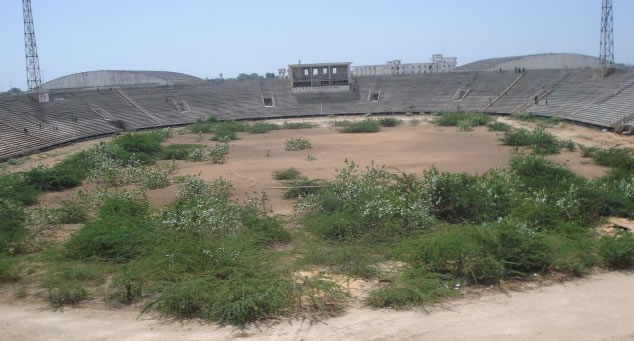
Somali National Stadium, Mogadishu

By Peter Martell
Wednesday, October 12, 2011
In what were once changing rooms, blood oozes down plastic tubes as its latest residents -- Ugandan soldiers -- donate supplies ready for battles to drive out diehard Islamist Shebab insurgents from war-torn Mogadishu.
"If my friends need my blood, or if I need extra blood, then it is good to be ready," said James Muasa, a Ugandan soldier with the African Union force, which fights alongside Somali troops from the weak Western-backed government.
The imposing stadium has been out of service ever since then-president Siad Barre was toppled in 1991, and Somalia slid into repeated rounds of civil war.
Its grim history is marked by graffiti on its crumbling walls left by the various soldiers, warlords and rebels who have put the sports stadium to alternative use.
On one entrance, military badges painted by Pakistani units colour the walls, left by peacekeepers based here in the 1990s when -- like today -- famine zones were declared in southern Somalia.
It was those Pakistani soldiers who in 1993 welcomed in US troops, who had fought through the city after battling Somali fighters when their helicopters were shot down, scenes made famous by the Hollywood film "Black Hawk Down."
"To survive you need balls," reads one slogan in English, spray-painted in a changing room turned military barrack.
Elsewhere, names carved into walls are written in the Amharic script of Ethiopia, messages left by troops in the 2006 US-backed Ethiopian invasion of Somalia, toppling an Islamist movement that briefly controlled the country.
Recently, the Al-Qaeda linked Shebab fighters used the 35,000-seater stadium as a training centre, turning the pitch into a firing range to test homemade armour piercing bullets, with an iron block as thick as a thumb riddled with holes.
More recent graffiti left by Shebab fighters includes pornographic scrawls, as well as childlike charcoal images of men with guns, or of pickup trucks mounted with machine guns, the vehicle of choice for Somali militiamen.
Seized by Ugandan troops two months ago, the stadium today is a key forward base for assaults on rebel holdouts, with battle tanks parked outside and machine gun posts surrounding the perimeter.
After four years of bloody fighting against AU and government forces, extremist Shebab fighters pulled out of key positions in the city in August, but diehards clung onto suburbs and strategic road junctions out of the city.
Ugandan troops launched a fresh offensive from the stadium Saturday, driving Shebab out of positions in the northeast of the city, after a Shebab suicide bomber last week killed at least 82 people.
Signs stuck on once elegant marble pillars provide troops with "lessons for urban warfare," including urging soldiers to note prominent buildings as landmarks during battles "as they usually remain intact."
"We'd like to have a football game here, a friendly between Uganda and the TFG (Somalia's Transitional Federal Government) soldiers," said Ronald Kakurungu, a Ugandan captain.
"We are still too busy, but it will be good to see the stadium back to normal use again," he added, waving at the crumbling stands.
Today, an armoured troop carrier is parked on the bumpy and dusty pitch, where a lonely donkey grazes the sparse grass.
In the long, gloomy corridors beneath the stands, training rooms and offices are now barracks for the Ugandan troops, with sandbags piled high in the broken windows as protection against snipers.
In another room, where Ugandan troops heave on body armour before heading out on patrol, there is graffiti that has likely found resonance with fighters from all the many nationalities and ideologies to have occupied the building.
"Take me home," it reads.
Source: AFP